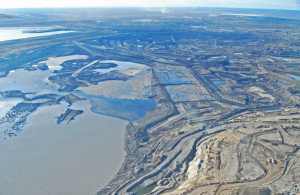
This program was originally broadcast on June 18, 2018.
It seems likely that the Canadian province of Alberta—home to a massive tar sands industry that produces some of the globe’s dirtiest and most polluting oil—has put the Pacific Northwest in its crosshairs. The province is partnering with the Canadian government, who recently nationalized the Kinder Morgan-owned Trans Mountain Pipeline, to ram through the expansion of the pipeline, a 715-mile conduit that would carry up to 890,000 barrels of oil per day from the Canadian interior to southwest British Columbia. Much of that oil would be exported by tanker from a port just outside Vancouver—resulting in a seven-fold increase in oil tanker trips from the Port of Vancouver into the Salish Sea. Additional tar sands oil would make its way south to Puget Sound refineries, via a 69-mile pipeline called the Puget Sound Pipeline.
On this episode of Locus Focus, we talk again with Sightline Institute's Eric de Place about what it means for Oregon and Washington, now that the Canadian government owns this unwanted pipeline that Kinder Morgan was about to walk away from.
Eric de Place is Sightline Institute's programs director, overseeing Sightline’s research and communications teams. He is also a researcher, writer, speaker, and policy analyst who spearheads the Institute’s work on energy policy. Known as a leading expert on coal and oil export plans in the Pacific Northwest, he is considered an authority on a range of issues connected to fossil fuel transport, including carbon emissions, local pollution, transportation system impacts, rail policy, and economics.
- KBOO



